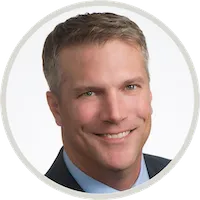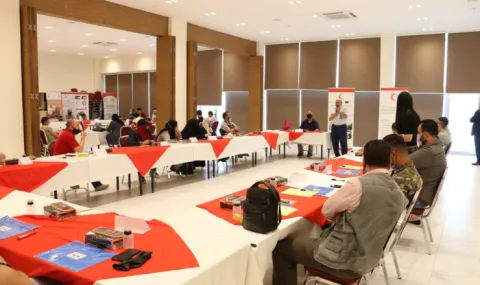Transforming Health Care Access: How Seattle Children’s Hospital is Reducing Barriers with Harvard Online Courses
Published November 1, 2024
Courses mentioned in this post: Reducing Racial Disparities in Health Care, Outsmarting Implicit Bias

At Seattle Children’s Hospital, providing world-class pediatric care goes hand in hand with addressing the complex barriers that prevent families from accessing vital health care services. For David Stolte, Senior Director of Regional Clinics and Urgent Care, these barriers are an ongoing challenge—but one that his team is committed to overcoming.
Through Harvard Online’s Reducing Racial Disparities in Health Care course, David and his team have gained new tools and perspectives that helped transform how they think about, measure, and address inequities in health care access. The results have been profound.
Identifying Barriers
In pediatric care, particularly in the clinics that David oversees, the demand for services is high, and many families face barriers that prevent them from easily accessing care.
“U.S. health care has a lot of barriers, especially for non-English-speaking populations. We have to fix that.” David shared. “Harvard Online’s courses helped me think about it [access to health care] differently and put some things in place to proactively reach out to the populations we’ve set up these barriers for.”
David’s team took part in Harvard Online’s Reducing Racial Disparities in Health Care course, which revealed the structures in health care systems that limit access for underserved populations.
“It’s not the same as me talking about it—having experts teach the course allowed my team to really learn the structures in place that prevent certain populations from getting access. That background was invaluable,” he explained.
Implementing Course Learnings
The course didn’t just provide theoretical knowledge; it equipped David’s team with actionable strategies for change. "The course was really about data collection and change management," David said.
"It helped us identify a shared need and figure out what to do about it. Then we were able to identify tactics and implement them quickly."
One of the most significant changes came in how David’s team addressed missed appointments in their clinics. “We don’t just look at missed appointments, we look at missed appointments by language other than English. And we track that. Since we created the program, we’ve seen a reduction in missed appointments among non-English-speaking populations, an outcome which is directly related to our learnings inside the course.”
The Bridges Program: A Community-Centered Approach
One of the key outcomes of the course was the expansion of the Bridges Program, an initiative designed to directly address the barriers non-English-speaking families face when accessing care. "Through the Bridges Program, a health care ‘navigator’ essentially reaches out to families, asking, 'What’s getting in the way of you coming to your appointment?’” It’s not about our assumptions but their voice," David explained. “And we help them, whether it’s transportation or scheduling.”
The program, which started in a single clinic, has since expanded to multiple locations across Seattle Children’s regional network.
“In some of our clinics, missed appointments by non-English speakers are now lower than for English speakers. The concepts and tools from this course helped reinforce that work and refocus on its necessity and expansion. Some of that success is related to what we learned in this course—measuring, listening, and taking action.”
Sustaining Impact and Overcoming Challenges
Despite the program’s success, there are still hurdles to overcome. David is hopeful that the demonstrated impact will help the Bridges Program become a long-term, self-sustaining initiative within the hospital system.
He’s committed to keeping these efforts alive, even as new challenges arise. "We need to serve the whole community, not just the ones that understand our complicated system and speak our language,” he said. “We’re still tracking how language impacts health care access because it’s crucial that we serve the whole community, not just the ones who can navigate our system."
David and his team at Seattle Children’s Hospital have proven that education and action go hand in hand. Through the insights gained from Harvard Online’s Reducing Racial Disparities in Health Care course, they have made significant strides in reducing health care inequities and ensuring that all families—regardless of language or background—have access to the care their children need.
As David advises other health care leaders:
“It’s OK to look outside of your organization for learning. You’re not expected to be experts at everything. Why not learn from those who are? Take the time for your team to go out and learn together. The growth and impact will be worth it.”
By prioritizing continuous learning and listening to their community, David and his team are helping to create a health care system that works for everyone.
Expanding Learning and Addressing Bias
While the Reducing Disparities in Health Care course had a significant impact on how David and his team approach barriers to care, their commitment to professional development didn’t stop there. David also completed Harvard Online’s Outsmarting Implicit Bias course, which further deepened his understanding of the hidden biases that affect decision-making in health care.
“As an individual learner, I found the Outsmarting Implicit Bias course incredibly eye-opening,” David shared. “It teaches you how to pay attention to the biases that show up, whether you want them to or not. The key takeaway for me was that bias is inevitable, but how you address it is what matters.”
David emphasized the importance of building on the insights gained from the Reducing Racial Disparities in Health Care course with the practical, everyday strategies learned in Outsmarting Implicit Bias. “The course made me much more conscious of how bias plays out in small, seemingly innocuous ways. It’s not just about racial bias—it’s things as subtle as judging someone based on their appearance or even eye spacing.”
“We’re still figuring out how to make this learning continuous, not episodic,” David explained. “The goal is to weave these lessons into the fabric of our everyday operations, ensuring we’re always improving how we serve our communities.”
As Seattle Children’s continues its journey of transformation, David’s leadership and commitment to ongoing education serve as a powerful reminder that health care isn’t just about treating patients—it’s about creating a system that works for everyone, with equity and compassion at its core.
If you’re inspired by David Stolte’s story and want to explore how Harvard Online’s Health Care Leadership courses can benefit you and your team, reach out today to discuss how we can support your organization’s professional development needs.
Related ArticlesUniRef Brings Harvard Courses on Web Programming to Syrian Refugees Image

Harvard Online in Your Workplace: Elevate Your Team's Professional Development Image

|